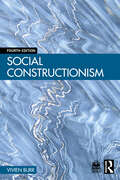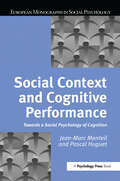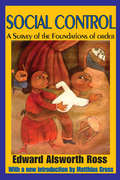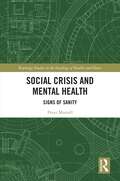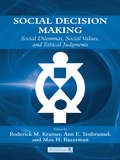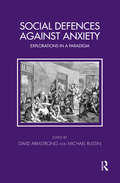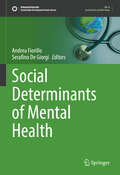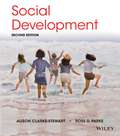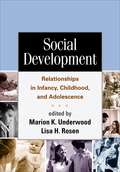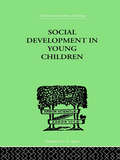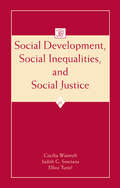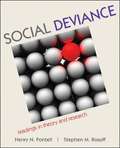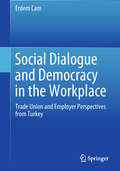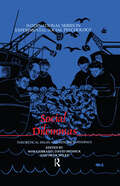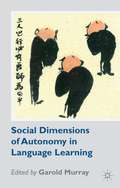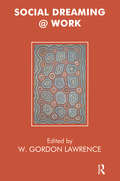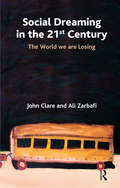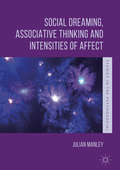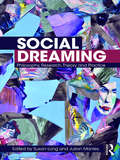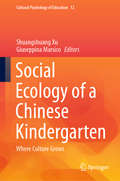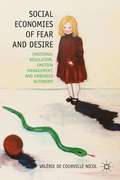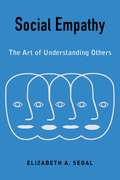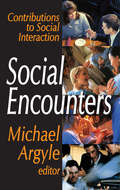- Table View
- List View
Social Constructionism
by Vivien BurrThe fourth edition of this seminal work introduces students to social constructionism. Using a variety of examples from everyday experience and from existing research in areas such as personality, sexuality and health, it clearly explains the basic theoretical assumptions of social constructionism.Drawing on a range of empirical studies, the book clearly defines the various approaches to social constructionist theory and research and explores the theoretical and practical issues they raise. It presents and analyses key debates, such as the nature and status of knowledge, truth, reality, and the self, in an accessible style. The new edition has been updated with relevant and contemporary references to aid understanding of key theoretical and methodological issues. The author additionally utilises new illustrative examples from research and contemporary life, such as the #MeToo movement, BlackLivesMatter, and Post-Truth politics. The updated work has also been expanded to include an extended discussion of affect and embodiment and a number of exercises to help illustrate important concepts.Social Constructionism extends and updates the material covered in previous editions and will be an invaluable and informative resource for undergraduate and postgraduate students of Psychology, Sociology, Education, and other related disciplines.
Social Constructionism, Discourse and Realism (Inquiries in Social Construction)
by Professor Ian PatrickThis book charts a clear and accessible path through some of the key debates in contemporary psychology. Drawing upon the wider critical and discursive turn in the human sciences, Social Constructionism, Discourse and Realism explores comprehensively the many claims about what we can know of `reality' in social constructionist and discursive research in psychology. Relativist versus realist tensions go to the heart of current theoretical and methodological issues, not only within psychology but across the social and human sciences. By mapping the connections between theory, method and politics in social research and placing these within the context of the broader social constructionist and discursive debates, the internationally renowned contributors offer the reader an invaluable survey of the debates.
Social Context and Cognitive Performance: Towards a Social Psychology of Cognition (European Monographs in Social Psychology)
by Pascal Huguet Jean-Marc MonteilBased on twenty years of research on the social regulation of academic performances, this book offers theoretical and empirical arguments in favour of the inclusion of the social dimension of human beings as essential for their cognitive activities. We all engage in social interactions, compare ourselves with other people, belong to social groups, and are the object of a myriad of categorisations. Not only do such social experiences affect cognition, but they actually determine its form and its content. Several experiments indeed reveal that cognitive performance depends on the relationship between the individual and the social context in which cognition takes place. And this relationship is not forged directly by features of the situation, but rather by personal construals of these features (most notably social comparison). This fact alone justifies granting the individual's social experiences a psychological status and it further strengthens the key idea of this book, namely that the social context only exists through the intervention of cognitive processes of contextualization (producing a "cognitive context of the self") such as those involved in autobiographical memory. A "social psychology of cognition" is suggested, in which the fashionable distinction between cognition and social cognition makes no sense. From this innovative perspective it is indeed more the social nature of the individual rather than that of the object to be processed that defines the social nature of cognition. Well-known phenomena such as social facilitation and social loafing as well as established educational practices are also re-examined from this perspective.
Social Control: A Survey of the Foundations of Order
by Edward Alsworth RossSocial Control falls within social psychology, which is the branch of knowledge that deals with the psychic interplay between man and his environment. In Ross' terms, one of these branches, social ascendency, deals with the domination of society over the individual. Another, individual ascendency, embraces such topics as invention, leadership, the role of great men, and deals with the domination of the individual over society.Social ascendency is divided into social infl uence-- mob mind, fashion, convention, custom, public opinion, and the like--and social control. Th e former is occupied with social domination that is without intention or purpose. The latter is concerned with social domination that is intended and that fulfi ls a function in the life of society. At the start of the twentieth century this work played an important role in the origination of social psychology as a distinct field.Ross sought to determine how far the order we see about us is due to infl uences that reach men and women without social intervention. Investigation shows that the personality freely unfolds under conditions of healthy fellowship and may arrive at goodness on its own, and that order is explained partly by this streak in human nature and partly by the infl uence of social surroundings. Ross' book separates the individual's contribution to social order from that of society, and, brings to light everything that is considered in the social contribution of the individual. Th is classic volume is an important contribution to the history of ideas.
Social Crisis and Mental Health: Signs of Sanity
by Peter MorrallThis book focuses on the paradoxical effect of social crises on mental health. When crises occur, there's an upsurge of mental suffering due to an intensification of such social insanities as violence, inequality, and insecurity. Paradoxically, there are positive consequences due to acts of kindness, cooperation, and the ability to cope and hope. Two interconnected categories of social crises are covered in the book. These are as follows: contagions (for example, the COVID-19 pandemic, numerous outbreaks of plague and smallpox since medieval times, and the 1918 influenza pandemic); conflicts (including the Russian invasion of Ukraine, and aspects of world war such as the Holocaust, the use of nuclear bombs in the Second World War, and the climate emergency). What is also explored in the book is whether there is an amplification of everyday difficulties whereby having a ‘mental health problem’ has become normalised. The idea of ‘mental-healthism’ is introduced to explain the cultural shift towards this apparent normalisation of ordinary psychological suffering. The book will be of interest to students, practitioners, and researchers from sociology, psychology, nursing, social work, and psychiatry, among others.
Social Decision Making: Social Dilemmas, Social Values, and Ethical Judgments (Organization and Management Series)
by Max H. Bazerman Ann E. Tenbrunsel Roderick M. KramerThis book, in honor of David Messick, is about social decisions and the role cooperation plays in social life. Noted contributors who worked with Dave over the years will discuss their work in social judgment, decision making and ethics which was so important to Dave. The book offers a unique and valuable contribution to the fields of social psychology and organizational behavior. Ethical decision making, a central focus of this volume, is highly relevant to current scholarship and research in both disciplines. The volume will be suitable for graduate level courses in organizational behavior, social psychology, business ethics, and sociology.
Social Defences Against Anxiety: Explorations in a Paradigm (Tavistock Clinic Series)
by David ArmstrongThis book revisits the theory of social systems as a defence against anxiety first set out by Elliott Jaques and Isabel Menzies Lyth in papers which they published in 1955 and 1960, and which have been influential points of reference ever since. Menzies Lyth's study of the nursing system of a general hospital, with its roots in both psychoanalysis and socio-technical systems thinking, has remained one of the most convincing demonstrations of the influence of unconscious anxieties on social behaviour, and of their effects in inducing dysfunctional defensive systems in organisations. The theory of 'social defences against anxiety' remains one of the most significant contributions of the 'Tavistock school' to the study of human relations. Contributors explore this theory as a generative paradigm, capable both of theoretical extension and of empirical application to different institutional settings. They review changes which have taken place in the theoretical and social context since these ideas were first advanced, and assess what conceptual revisions these developments require.
Social Determinants of Mental Health (Sustainable Development Goals Series)
by Andrea Fiorillo Serafino De GiorgiThis book provides a comprehensive exploration of the social determinants of mental health and enhances our understanding of their impact on the development and manifestation of various mental disorders. It offers new insights on the complex interplay between genetic, biological, and social determinants, and highlights the crucial role that social determinants play in shaping the risk and protective factors for mental health. The volume covers factors such as migration, pollution, urbanization, and discrimination that contribute to the development, onset and outcome of major mental health problems, including schizophrenia, major depression, bipolar disorder, and anxiety disorders. Additionally, the book fosters well-being and promotes mental health by emphasizing strategies to fight stigma and discrimination, prevent mental disorders with home-based, school-based, or workplace-based supportive measures. It calls for making mental health accessible to everyone and outlines the importance of addressing social determinants to promote mental well-being.
Social Development
by Alison Clarke-Stewart Ross D. ParkeSocial Development, 2nd Edition provides psychologists with a comprehensive, scholarly, engaging, and up-to-date treatment of theoretical insights and empirical findings in the field of social development. <P><P>It conveys the excitement of recent advances along with the accumulated knowledge that forms the basis of the field. Psychologists will gain a better understanding of cultural variation, both among societies around the world and within our own society.
Social Development
by Marion Underwood Lisa RosenThis authoritative, engaging text examines the key role of relationships in child and adolescent development, from the earliest infant-caregiver transactions to peer interactions, friendships, and romantic partnerships. Following the sequence of a typical social development course, sections cover foundational developmental science, the self and relationships, social behaviors, contexts for social development, and risk and resilience. Leading experts thoroughly review their respective areas and highlight the most compelling current issues, methods, and research directions. End-of-chapter suggested reading lists direct students and instructors to exemplary primary sources on each topic
Social Development In Young Children: A Study Of Beginners
by Isaacs, SusanFirst published in 1999. Routledge is an imprint of Taylor & Francis, an informa company.
Social Development, Social Inequalities, and Social Justice (Jean Piaget Symposia Ser.)
by Cecilia Wainryb Judith G. Smetana Elliot TurielThis volume considers previously separate bodies of research on social justice, social equality, and social development. Eminent scholars from a variety of disciplines discuss the latest research to help us understand the relation between social inequalities and social development. In so doing, the book documents the powerful ways that social inequ
Social Deviance: Readings In Theory And Research
by Stephen M. Rosoff Henry N. PontellIn its first edition with McGraw-Hill, this comprehensive source of classic and contemporary readings will help students learn who becomes deviant, why people become deviant, and how individual and institutional reactions help define the social reality of deviants (the persons) and deviance (the behavior). The selected readings provide experiences for students by providing a solid foundation in the field and a means by which to examine contemporary issues.
Social Dialogue and Democracy in the Workplace: Trade Union and Employer Perspectives from Turkey
by Erdem CamThis book focuses on the experience of social dialogue in Turkey, which is a European Union candidate country. It argues that social dialogue constitutes one of the fundamental pillars of European social model and therefore should be analysed not only at the supranational level but also at the national, sectoral and workplace levels. The book critically examines social dialogue processes and mechanisms in Turkey at various levels, with focus on the workplace because it is shaped by socio-cultural elements which contain many variables. The book also identifies the shortcomings and structural impediments of social dialogue, and provides an empirically grounded theoretical explanation of social dialogue in Turkey. In the process, the book explains and clarifies key concepts to help readers grasp important points relevant to social dialogue, and contains interviews with social partners to take into consideration their views and recommendations on social dialogue. These in-depth interviews also provide a rare insight into the dynamics of social dialogue on the ground. By looking at social dialogue at various levels, the book offers a balanced view of its strengths and weaknesses in Turkey. This book is a valuable tool for students, academics and researchers interested in understanding the complex dynamics of social dialogue and workplace relations in Turkey.
Social Dilemmas: Theoretical Issues and Research Findings (International Series in Social Psychology #Vol. 25)
by David M. Messick Wim B. G. Liebrand Henk A. M. WilkeThis book describes the advances and insights made by social scientists from around the world into the understanding and resolution of social dilemmas. Each chapter discusses its own research findings against the background of a more comprehensive view of social dilemnas.
Social Dimensions of Autonomy in Language Learning
by Garold MurrayThis book examines how autonomy in language learning is fostered and constrained in social settings through interaction with others and various contextual features. With theoretical grounding, the authors discuss the implications for practice in classrooms, distance education, self-access centres, as well as virtual and social learning spaces.
Social Dominance
by Jim Sidanius Felicia PrattoThis volume focuses on two questions: why do people from one social group oppress and discriminate against people from other groups? and why is this oppression so mind numbingly difficult to eliminate? The answers to these questions are framed using the conceptual framework of social dominance theory. Social dominance theory argues that the major forms of intergroup conflict, such as racism, classism and patriarchy, are all basically derived from the basic human predisposition to form and maintain hierarchical and group-based systems of social organization. In essence, social dominance theory presumes that, beneath major and sometimes profound difference between different human societies, there is also a basic grammar of social power shared by all societies in common. We use social dominance theory in an attempt to identify the elements of this grammar and to understand how these elements interact and reinforce each other to produce and maintain group-based social hierarchy.
Social Dreaming @ Work
by David Armstrong W. Gordon Lawrence"Social Dreaming" is the name given to a method of working with dreams that are shared and associated to within a gathering of people, coming together for this purpose. Its immediate origins date back to the early 1980s. At that time, Gordon Lawrence was on the scientific staff of the Tavistock Institute of Human Relations. He was a core member of the Institute's Group Relations Programme, within which he had developed a distinctive approach centring around the concept of "relatedness" — that is, the ways in which individual experience and behaviour reflects and is structured by conscious and unconscious constructs of the group or organization in the mind...
Social Dreaming in the 21st Century: The World We Are Losing
by John Clare Ali ZarbafiWe are running out of ideas in Western society. Faced with global warming, Third World devastation, nuclear proliferation and the threat posed by religious conflict, we need new ways of thinking. After the loss and carnage of the Twentieth Century there is prevailing mood of uncertainty and paranoia, yet at the same time a denial of tragedy, a salvation fantasy, an illusion that we will be saved. The decline in social solidarity, the fragmentation of communal values and a growing sense of 'I' as opposed to 'we', are all signs of an inversion of moral certitudes, a disconnection from reality. This book asks what methods do we have at our disposal to understand and reverse this breakdown of communication within and between communities.
Social Dreaming, Associative Thinking and Intensities of Affect (Studies in the Psychosocial)
by Julian ManleyThis book describes a way of sharing dreams in a group, called ‘social dreaming’. It explores how the sharing of real, night time dreams, in a group, can offer information on and insight into ourselves and the worlds we live in and share. It investigates how we can turn dream images, and ideas and feelings that arise from these images, into conscious thought, before describing the ways in which these can be used. Using a background of the psychosocial combined with a philosophical lens influenced by the work of Gilles Deleuze, Julian Manley shows how social dreaming can be understood as a Deleuzian ‘rhizome of affects’, a web or a root design where things interconnect in a random and spontaneous fashion rather than in a sequential or linear way. He illustrates how social dreaming can link dreams together into a collage of images, and compares this to the rhizome, where clusters of emotional intensity – which emerge from the dream images – weave and interconnect with other clusters, forming a web of interlinked dream images and emotions. From the basis of this rhizome emerges an interpretation of social dreaming as a ‘body without organs’ and the social dreaming matrix as a ‘smooth space’ where meanings emerge from the way these images form connections, and come and go according to our emotions at any particular moment.
Social Dreaming: Philosophy, Research, Theory and Practice (Studies in the Psychosocial)
by Susan Long Julian ManleyThe idea of social dreaming argues that dreams are relevant to the wider social sphere and have a collective resonance that goes beyond the personal narrative. In this fascinating collection, the principles of social dreaming are explored to uncover shared anxieties and prejudices, suggest likely responses, enhance cultural surveys, inform managerial policies and embody community affiliation. Including, for the first time, a coherent epistemology to support the theoretical principles of the field, the book reflects upon and extends the theory and philosophy behind the method, as well as discussing new research in the area, and how social dreaming practice is conducted in a range of localities, situations and circumstances. The book will appeal to anyone interested in the idea that social dreaming can help us to delve deeper into the question of what it means to be human, from psychoanalysts to sociologists and beyond.
Social Ecology of a Chinese Kindergarten: Where culture grows (Cultural Psychology of Education #12)
by Giuseppina Marsico Shuangshuang XuThis book is the outcome of a joint collaboration between East China Normal University and the University of Luxembourg, initiated by the Center of Ideas for the Basic Education of the Future (IBEF), and focuses on kindergartens in China from a cultural psychology perspective. By coupling young scholars from diverse cultural backgrounds as research tandems, this book uses an innovative methodological method to reveal a deeply immersing research perspective of the often complicated issues in the Chinese social reality, where long historical tradition and strong motivation for a “modernized” future are fused together and continuously evolve itself into a vibrant and intricate landscape. Meanings and values consciously or unconsciously promoted and conducted in the kindergarten are semiotic devices and they mediate children’s and educator’s daily behaviours and activities, which are constantly navigating among different social institutions and crossing the border of kindergarten. The book discusses the process of children’s socialization in the kindergarten from different angles such as cultural objects, moral education, conflict negotiation, children's drawing analysis and the role of Lego in numeracy development. It also provides an overview of basic educational needs in Chinese kindergartens as well as three commentaries to provide background information and to add a reflective angle for the readers. By reading the book, readers will hopefully go through a constantly transforming process between familiarizing and de-familiarizing along with the research tandem and develop their own understanding of the complex landscape of the Chinese kindergarten and its children as developing subjects constantly living and transcending the context.
Social Economies of Fear and Desire: Emotional Regulation, Emotion Management, and Embodied Autonomy
by Valérie de Courville NicolAll behaviours, indeed all forms of agency, are viewed as emotionally-driven. This book provides an approach to emotional experience and agency which drastically nuances the commonly held view that fear has predominantly irrational, morally, or ideologically suspect effects which thwart the exercise of autonomy.
Social Empathy: The Art of Understanding Others
by Elizabeth SegalOur ability to understand others and help others understand us is essential to our individual and collective well-being. Yet there are many barriers that keep us from walking in the shoes of others: fear, skepticism, and power structures that separate us from those outside our narrow groups. To progress in a multicultural world and ensure our common good, we need to overcome these obstacles. Our best hope can be found in the skill of empathy.In Social Empathy, Elizabeth A. Segal explains how we can develop our ability to understand one another and have compassion toward different social groups. When we are socially empathic, we not only imagine what it is like to be another person, but we consider their social, economic, and political circumstances and what shaped them. Segal explains the evolutionary and learned components of interpersonal and social empathy, including neurobiological factors and the role of social structures. Ultimately, empathy is not only a part of interpersonal relations: it is fundamental to interactions between different social groups and can be a way to bridge diverse people and communities. A clear and useful explanation of an often misunderstood concept, Social Empathy brings together sociology, psychology, social work, and cognitive neuroscience to illustrate how to become better advocates for justice.
Social Encounters: Contributions to Social Interaction
by Michael ArgyleSocial Encounters is an approach to social psychology that is not what one might expect to find in textbooks on this subject. As a companion to Social Interaction advocated by Michael Argyle and his associates, it has been used by a rapidly growing number of researchers in social psychology, and related aspects of ethology, anthropology, and linguistics. The two key ideas are to study the detailed processes of social interaction at the level of the elements of interaction, and to relate social behavior to its biological basis and cultural setting.This work collects excellent representative studies of different aspects of social interaction; as such they are important in their own right. Within the general approach described, a range of different academic orientations are included. All selections report empirical findings, and most of them introduce conceptual notions as well. One achievement of the volume has been to establish the basic elements of which social interaction consists; current research is concerned with finding out precisely how these elements function.The contributors agree that the field consists of various signals: verbal and non-verbal, tactile, visible and audible, bodily contact, proximity, orientation, bodily posture, physical appearance, facial expression, movements of head and hands, direction of gaze, timing of speech, emotional tone of speech, speech errors, type of utterance and linguistic structure of utterance. These elements can be further analyzed and divided into categories or dimensions; each plays a distinctive role in social interaction. Social behavior is studied in natural settings or replicas of natural settings, for which there are cultural rules familiar to the subjects. This is a pioneering statement in sociobiology.
